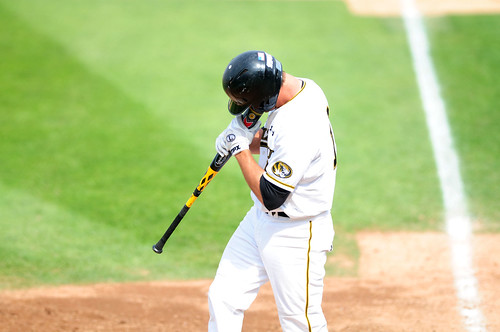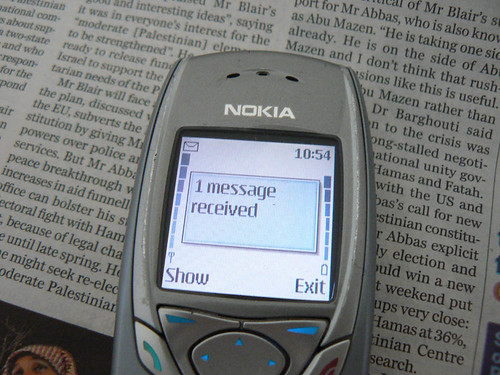A brief comment in advance of this post: like the majority of the commentary on this blog, this post is meant as a representation of events observed. Somewhere, between observation and judgment, there’s truth. And yes, truth is not as universal a concept as we’d like it to be. Now: on with the post.
My cousin Scott is about eight years old. He has short brown hair and all the energy of a Luna Bar. His favorite album is Green Day’s “American Idiot,” and when he sings along to the title track, he is his own seven-second tape delay. “And can you hear the sound of hysteria?” he’ll sing. “The subliminal mind bleep, America.” He does not fully understand that “bleep” is not an original Billie Joe Armstrong lyric.
Scott, so inspired by his favorite album, started taking guitar lessons about two years ago. His hands are not big enough to form many of the chord shapes, so he mostly just thumbs along to the bass lines. These days, he’s good enough to play versions of songs like “Iron Man” or “Seven Nation Army.”
I bring this up, because the only difference between Duke Maxwell and my cousin Scott is that on Monday, Scott will be attending class, because Scott is in the second grade. Duke, however, will be in Nashville. And then the week after, he’ll be in Denver. And then the week after that in Salt Lake City.
What I mean to say is that the only difference, really, between Duke Maxwell and my cousin Scott – once you get past the nylon-stringed guitar and the too-small-to-play-anything-in-the-key-of-G hands and the fact that they’re both eight years old – is that my cousin Scott isn’t the lead singer of a touring rockabilly family band.
On Friday night, I was walking toward the Blue Fugue, a Columbia bar that actually takes pride in the fact that it’s such a dive. The place is about as well lit as the inside of a nuclear submarine. They’ve got antique violins and tubas and shotguns pinned to their walls. In the back of the bar, there’s a bookcase featuring titles by Henry Cabot Lodge. Next to the bookcase, someone’s outlined images of naked women in chalk. Mistletoe hangs from a chandelier nearby. No one’s bothered to take it down from last Christmas, or maybe the Christmas before that. I can’t tell which.
The Fugue, as locals know it, is kind of a townie bar for the yuppie set, if that makes any sense. Half the men in the crowd are wearing plaid. The rest are wearing bandanas, except for two guys in the back who are still wearing their gas station uniforms.
The Fugue is a Missourian’s bar, and they’re damn proud of it. At the Fugue, you’re drinking whiskey, Bud, or Stag; Miller Lite is considered an export.
But more than the torn cushions on the barstools or the refusal to accept any trend not involving vintage clothing, the Fugue is defined by one quality: it’s loud. Like, Spinal-Tap-turn-it-to-11-loud. Like, inside-the-whammy-bar-on-Kirk-Hammett’s-guitar-at-a-Metallica-concert loud.
The Fugue is one of those places that you’ll always hear before you see 1.. On Friday night, walking up 9th Street, I heard it from about four blocks away. I wasn’t expecting to stop by; really, I wanted to go to Quinton’s, the bar next door that serves Boulevard Wheat in a glass that’s about the size of a household vase. But within earshot of the Fugue, my friend, Nate, made an observation that I seconded: whoever was playing at the Fugue was awesome. Their drummer kept the cymbals splashy. Their base lines were spot on.
So Nate and I went inside.
The second thing you’ll notice about Mad Max and the Wild Ones is that they’re actually pretty good. That wasn’t a surprise; we could tell from 9th Street that whoever was playing the Fugue could do more than keep 4/4 time.
But if you ever see them in concert, you probably won’t even remember whether or not they were any good, and you certainly wouldn’t if you were at the Fugue on Friday night. That crowd was too hopped on Stag or PBR to care what was being played.
But I guarantee you that more than a handful of Fugue-goers woke up Saturday morning and asked themselves, “Was I drunk, or was that band last night headlined by an eight year old?”
A few minutes before midnight, the four members of Mad Max and the Wild Ones are on stage at the Fugue, killing. The drummer, Cole Maxwell, has just finished an impressive two-minute drum solo, and the crowd is roaring.
Cole Maxwell is 13 years old.
Now he’s standing over a bass drum, keeping the beat while spinning the drumsticks in his hands and looking not unlike Iceman twirling his pen in “Top Gun.” Cole is wearing a red shirt and an unusual tie; he looks very much like KFC’s Colonel Sanders, only if the Colonel had been dressed by Meg White. He is wearing a black jacket with leopard print, the kind of print that stays in style only in Dirk Diggler films or Miami. His hair is slicked back in the style of Elvis Presley. The other three members of Mad Max and the Wild Ones are dressed in an identical manner.
The bass player leans into the microphone – an unusual, old-style radio mike, but with the catch that this mike is glowing a neon blue – and yells something. What, I’m not sure, and therein lies the problem with the Fugue: the acoustics make it impossible to hear anything being said or sung. The crowd, confused at what’s happening, just roars back their approval.
It’s at this point that the band’s eight-year-old lead singer starts in with Johnny Cash’s “I’ve Been Everywhere.”
 “I’ve Been Everywhere” is not so much a song as a warm-up exercise for auctioneers; in roughly three minutes, Johnny Cash croons out the names to 91 different locations.
“I’ve Been Everywhere” is not so much a song as a warm-up exercise for auctioneers; in roughly three minutes, Johnny Cash croons out the names to 91 different locations.
Watching eight-year-old Duke Maxwell – pictured at right – sing it through, my only question is if the band’s lead singer can find a quarter of these places on a map.
And yet, Duke powers through the song, only taking a breather for an extended guitar solo, in which the band’s bass guitarist lays down his upright bass on the stage, and the guitarist hops on top of it to hammer out a few bars. Meanwhile, Duke slides out of the way.
A nylon-stringed red guitar – the inscription “Wild West Sweethearts” painted onto its body – hangs over his left shoulder.
The show ends a few minutes after midnight, but not before Cole Maxwell – standing on a two-foot-high box – plays the upright bass, and certainly not before the band’s closing number: “Radar Love” by Golden Earring. It’s played rockabilly style. Somehow.
Then the band packs up their things. I wander over to the guitarist. His name is Wyatt, and he’s the eldest Maxwell child. He tells me that they’re just a family rockabilly band from a town just south of Salt Lake City.
I’m suddenly frozen in an odd moment of clarity. In four years of living in mid-Missouri, I’d told myself that I’d seen every weird thing there was to see in this state.
But until that moment, I hadn’t considered the idea that Utah might be weirder.
While Mad Max and the Wild Ones are packing up their instruments, the lead singer of the Fugue’s headlining band is on stage. He has a full beard, and he’s drinking beer directly out of a pitcher.
Conversely, Mad Max’s lead singer is two years away from learning that he can grow a beard, about five from shaving for the first time, and 13 years from that first beer.
The bass player – who turns out to be the father of the rest of the band – is outside. He’s taken off his leopard-print jacket and tie, and now he’s down to an undershirt and about three pounds of hair gel, and looking surprisingly like Michael Madsen. He’s loading up the band’s trailer. On one side, it has the band’s name, and beneath it, the words “Rockabilly Revue.” On the back, it simply reads: “Terrorizing a City Near You.”
There is a tattoo of a woman on the father’s right bicep. Behind her, greenish-reddish-blackish flames shoot up his arm. Below her, five cards are flipped, face-side open. There are no dollar bills tattooed on his arm, but I can’t help but think that he’s been playing with house money all along.
Later that night, I sit awake and think of freshman year. I was at a U2 concert in St. Louis; I’d snuck into much better seats than I deserved. A friend and I found seats near the stage, about a dozen rows up. Behind us, we noticed two gentlemen struggling to reserve seats for friends. We asked them why they were working so hard to keep their seats reserved.
“Oh,” they said, “these seats are for Hanson.”
“Excuse me?” my friend asked.
“Hanson,” one of the gentlemen said. “You know, ‘MMMBop’? Hanson? ‘MMMBop’?”
“Yes,” my friend said. “We know Hanson.” We had, after all, been in elementary school when a family band from Oklahoma hit #1 on the pop charts. We hadn’t forgotten the pre-N’Sync sensation that was “MMMBop.”
But what struck me that night was — once they showed up in their seats — how relatively normal the Hanson guys seemed. Almost a decade after topping the charts, they were just hanging out in St. Louis, listening to four Irish guys who’d been playing music since they were teenagers. The Hanson brothers were famous once; among my generation, they’ll be infamous for much longer. But that didn’t seem to bother them that much, at least on that night in St. Louis.
I do not believe that Mad Max and the Wild Ones are like Hanson or The Jackson Five or the Von Trapps, or any other family band. They do not sound like them; more notably, I do not believe that they are as talented as any of them. But that does not mean that they will end up any better or any worse than any of the bands I’ve just mentioned.
So I sit awake Friday night and wonder: Do these kids go to school? Do they want to be here? And if they don’t, would they even be able to tell their father so?
To me, what these kids are doing – dressing up like either Elvis or Jack White or Jack White impersonating Elvis – and playing regular tour dates on the road a few thousand miles from home seems like borderline child abuse. These kids are talented, sure, and I’d agree that talent is worth nurturing. But I want to know at what cost 2..
So I go to bed without answers. I wake up the next day and ask myself the same questions. Same questions; no answers.
I wonder if I will ever have answers. I wonder when I will ever have answers.
I wonder whether Cole or Duke Maxwell think this is normal.
I wonder whether they will ever forgive their father.
I wonder whether one day, thanks to a rockabilly band, Cole and Duke Maxwell will really go anywhere worth going.
1. In this way, the Blue Fugue is actually a lot like my mother. >back to article
2. To which I offer two cases of parents pushing kids at a young age: Tiger Woods (who turned out okay) and Todd Marinovich (who bombed out of the NFL and then hit rock bottom as a drug abuser). Certainly, the Wild Ones aren’t on the Marinovich scale; his father stretched him in his crib as an infant, and at four, had trained him to the point where Todd could run four miles at an eight-minute-mile pace. The point worth noting here: whether you’re talking about nurturing the best sixth grader in the country — be it a basketball player, like Allonzo Trier, or a drummer, like Cole — I do not believe that chilren are capable of handling such pressure. But I’m not a psychologist; I’m just a kid who was 12-years-old not all that long ago. >back to article
UPDATES: The band wrote in after the post with their comments. Sadly, when I moved this blog from Blogger to WordPress, the comments disappeared. The long and short of it is: I was wrong. They were angry, and justified in their anger. I apologized for the post. In 2012, I went back and reflected upon this initial piece.
H/T to Mad Max’s MySpace page for all photos.










